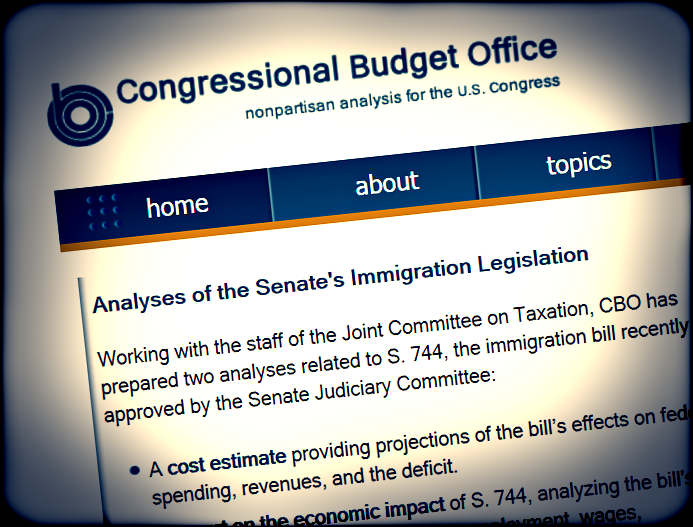
Washington, D.C. (June 19, 2013) – The central purpose of the Schumer-Rubio bill (S.744) is to reduce future illegal immigration. In fact, Sen. Chuck Schumer has said that its passage would mean "Illegal immigration will be a thing of the past."
But the Center for Immigration Studies finds that the new Congressional Budget Office (CBO) analysis of the legislation confirms that the bill will almost completely fail in this regard. According to CBO, if S.744 passes, "the net annual flow of unauthorized residents would decrease by 25 percent." Because S.744 fails to stem a larger portion of illegal immigration, CBO projects that nearly 5 million new illegal immigrants and their children will be living in the United States 10 years after the bill passes.
Among CBO's findings:
- CBO projects 4.8 million new illegal immigrants and their U.S.-born children will be living in the country by 2023 if the bill becomes law, compared to 6.4 million without it – a mere 25% reduction in future illegal immigration (page 23).
- CBO projections mean that in the first ten years after the passage of S.744, new illegal immigration will add nearly 500,000 illegal residents and their children to the U.S. population each year.
- CBO projects that by 2033 7.5 million new illegal immigrants and their U.S.-born children will be in the country if the bill passes, compared to 10 million without the bill, so even in the very long term S.744 only reduces illegal immigration by 25% (page 23).
- To be clear, the 4.8 million new illegal immigrants and their children in the country by 2023 and the 6.4 million by 2033 are new arrivals, plus the children they will have once here.
- One of the reasons that illegal immigration will remain so high, according to CBO, is the bill itself will encourage illegal immigration. CBO states, "aspects of the bill would probably increase the number of unauthorized residents – in particular, people overstaying their visas issued under the new programs for temporary workers"(page 23).
- None of the costs associated with the 4.8 million illegals and their children in 2023 or the 7.5 million in 2033 are considered by CBO because they are assumed to be part of the "baseline" costs that would exist anyway. CBO only "scores" changes from the baseline. Thus, the projected slight fall off in illegal immigration (25%) is scored as a positive by CBO, no matter how large the actual costs of new illegal immigrants and their children.
Explaining CBO projections of future illegal immigration
On page 23 of its report CBO projects future levels of illegal immigration. Like much in the CBO report, the discussion of future illegal immigration is not particularly clear. However, CBO does state, "the net annual flow of unauthorized residents would decrease by about 25 percent relative to what would occur under current law, resulting in a reduction in the U.S. population (including a reduction in the number of children born in the United States) relative to that benchmark of 1.6 million in 2023 and 2.5 million in 2033." Thus, according to CBO, the total new illegal immigrant population (plus children) would have been 6.4 million by 2023, but will be 4.8 million if S.744 passes, which is 25 percent (1.6 million) smaller than it otherwise would have been. By 2033 the illegal population (plus children) will be 7.5 million which is 25% (2.5 million) smaller than the 10 million it would otherwise have been.
The costs of S.744
CBO also estimates the costs of S.744. But how those costs are calculated is not clearly explained, so they are difficult to evaluate. It is the intention of the Center for Immigration Studies to evaluate these cost estimates in future publications.
See the report from a 2010 Center symposium on "The Politics and Practicalities of Exit Controls" at https://www.cis.org/exit-panel.
